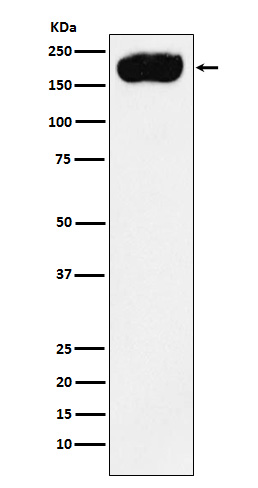
| WB | 咨询技术 | Human,Mouse,Rat |
| IF | 1/20 | Human,Mouse,Rat |
| IHC | 1/50-1/100 | Human,Mouse,Rat |
| ICC | 1/50-1/200 | Human,Mouse,Rat |
| FCM | 咨询技术 | Human,Mouse,Rat |
| Elisa | 咨询技术 | Human,Mouse,Rat |
| Aliases | ATP2B1; PMCA1;;PMCA1 |
| WB Predicted band size | Calculated MW: 135 kDa ; Observed MW: 130-250 kDa |
| Host/Isotype | Rabbit IgG |
| Antibody Type | Primary antibody |
| Storage | Store at 4°C short term. Aliquot and store at -20°C long term. Avoid freeze/thaw cycles. |
| Species Reactivity | Human,Mouse,Rat |
| Immunogen | A synthesized peptide derived from human PMCA1 |
| Formulation | Purified antibody in PBS with 0.05% sodium azide,0.05% BSA and 50% glycerol. |
+ +
以下是与Acetyl-Histone H2B (Lys15)抗体相关的3篇参考文献,按研究背景和抗体应用方向概括:
---
1. **文献名称**:*"Site-Specific Acetylation of Histone H2B in Chromatin by p300 Coactivates Transcription"*
**作者**:Hye-Ran Kim et al.
**摘要**:研究揭示了p300介导的H2B Lys15乙酰化在基因转录激活中的关键作用,通过特异性抗体(如Acetyl-Histone H2B (Lys15))的染色质免疫沉淀(ChIP)实验,证实该修饰直接促进启动子区域的染色质开放及转录延伸。
2. **文献名称**:*"DNA Damage-Induced Acetylation of Histone H2B at Lys15 Promotes Apoptosis"*
**作者**:Takahiro Nakamura et al.
**摘要**:利用Acetyl-Histone H2B (Lys15)特异性抗体,证明电离辐射诱导的H2B K15乙酰化通过激活促凋亡基因(如BAX),触发细胞程序性死亡,提示该抗体在DNA损伤应答研究中的关键工具价值。
3. **文献名称**:*"Development of a Monoclonal Antibody Specific for Acetylated Lysine 15 on Histone H2B"*
**作者**:Sarah J. Bannister et al.
**摘要**:详细描述了Acetyl-Histone H2B (Lys15)单克隆抗体的制备及验证流程,包括质谱验证表位特异性、Western blot和免疫荧光应用效果,证明其在检测细胞周期依赖的乙酰化动态中的高灵敏度。
---
以上文献涵盖了该抗体在机制研究(转录调控、DNA损伤应答)和抗体开发中的典型应用。如需具体DOI或补充更多文献,可进一步说明。
The Acetyl-Histone H2B (Lys15) antibody is a specialized tool used to detect the acetylation of lysine 15 (K15) on histone H2B, a post-translational modification (PTM) associated with chromatin remodeling and transcriptional regulation. Histones, including H2B, are core components of nucleosomes, which compact DNA into chromatin. Post-translational modifications such as acetylation, methylation, or phosphorylation dynamically alter chromatin structure, influencing gene expression by modulating DNA accessibility. Acetylation of histones, including H2B at K15. is generally linked to transcriptional activation, as it neutralizes the positive charge on lysine residues, reducing histone-DNA interactions and promoting an open chromatin state. This modification is regulated by histone acetyltransferases (HATs) and deacetylases (HDACs).
The Acetyl-Histone H2B (Lys15) antibody is widely used in epigenetic research to study site-specific acetylation patterns in processes like DNA repair, replication, and cell differentiation. It enables detection via techniques such as Western blotting, immunofluorescence, or chromatin immunoprecipitation (ChIP). Dysregulation of histone acetylation is implicated in diseases like cancer, making this antibody valuable for exploring epigenetic mechanisms in pathology or therapeutic contexts. Specificity for K15 acetylation ensures precise identification of this modification, distinguishing it from other histone marks. Researchers utilize it to investigate crosstalk between H2B acetylation and other histone modifications, as well as its role in maintaining genomic stability or regulating developmental pathways.
×